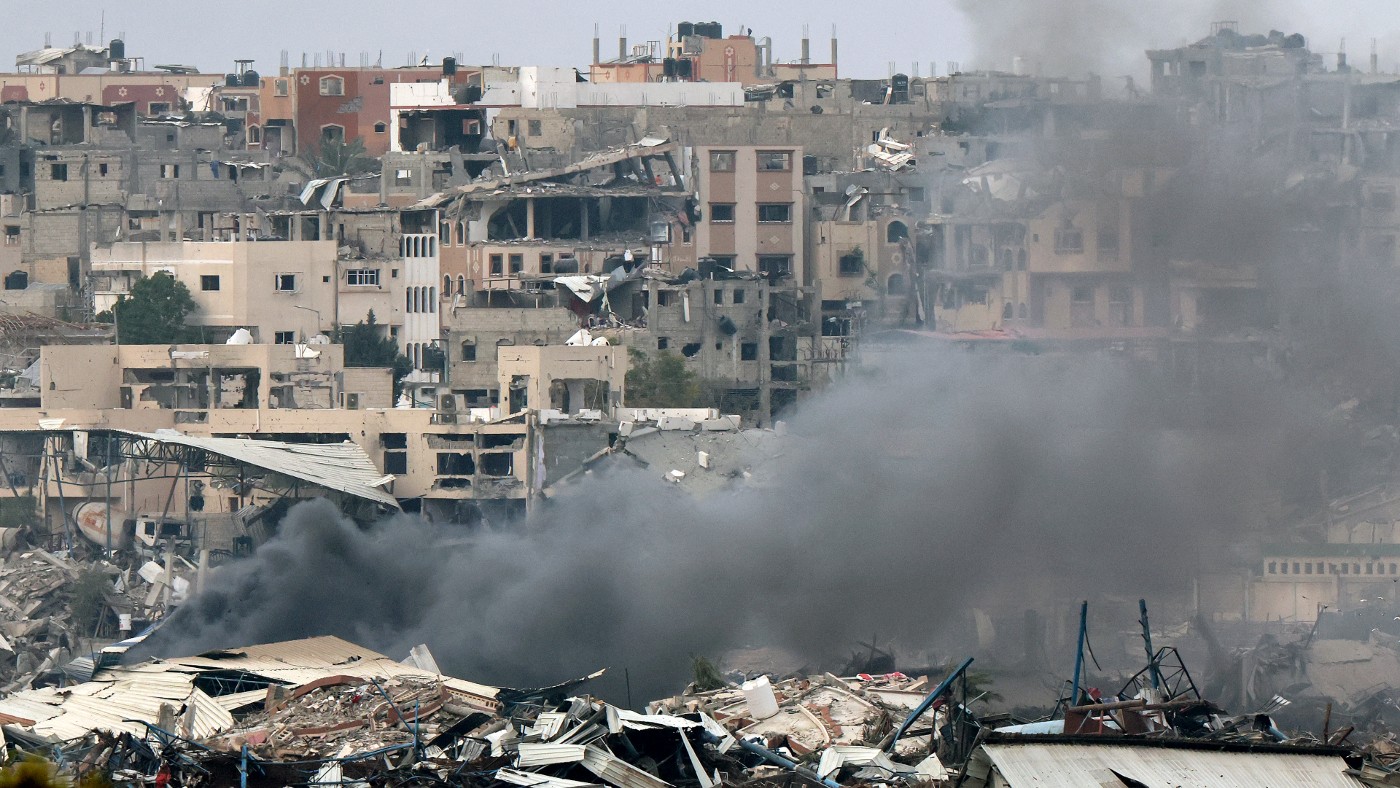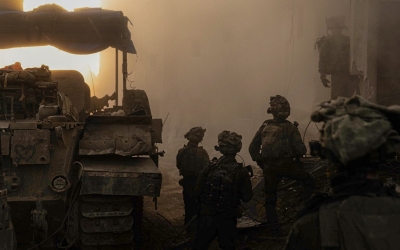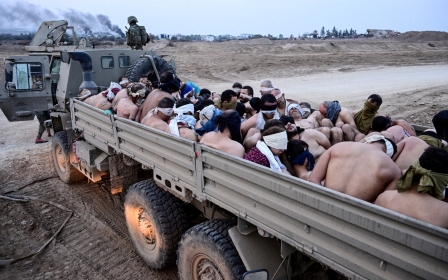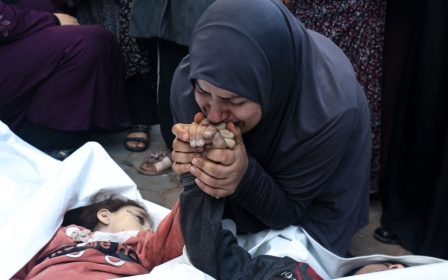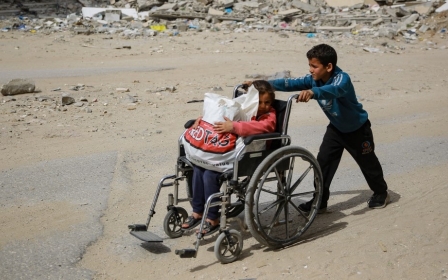War on Gaza: One Palestinian woman's journey through death and destruction
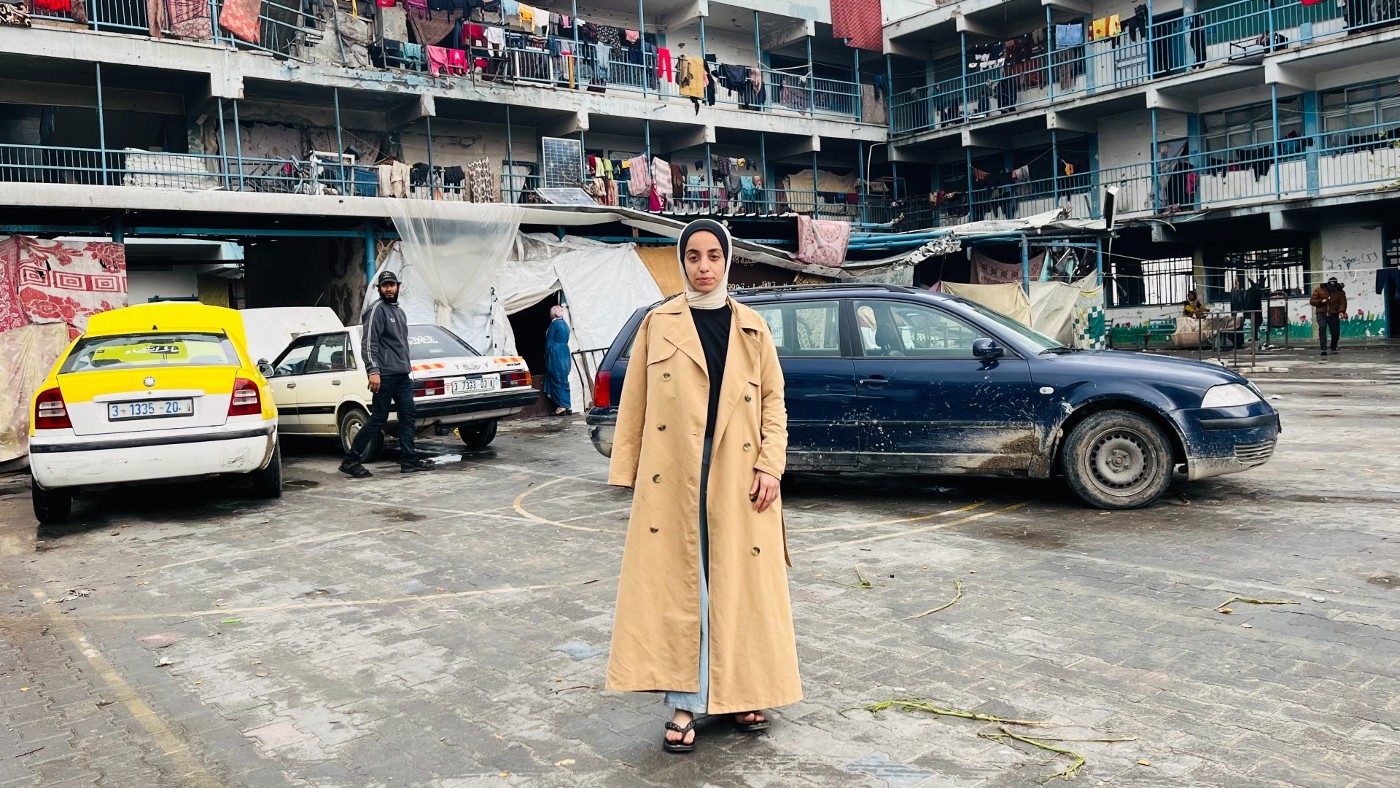
After the war in Gaza began on 7 October, Mayar al-Jakhbir and her family were forced to leave their home in Beit Lahia, in the north of the Strip.
Eventually, they took shelter in al-Qasaib, a neighbourhood in Jabalia, just south of their home.
Israeli troops launched ground operations in Jabalia on 8 November, with Palestinian fighters mounting fierce resistance. On 11 December, the Israeli army besieged al-Qasaib and invaded the house where al-Jakhbir and 20 other Palestinians, including children and elderly people, were staying.
“It was unspeakable. They beat us brutally, tortured us, threw gas grenades at us, stole our money, and used us as human shields. It lasted from 9am until the evening,” al-Jakhbir told Middle East Eye.
According to the 20-year-old Palestinian woman, Israeli soldiers stripped her siblings, beating and humiliating them. At night, she said, they brought her handcuffed uncle, Imad, back into the room the rest of the family were in and began hitting him with a dagger.
New MEE newsletter: Jerusalem Dispatch
Sign up to get the latest insights and analysis on Israel-Palestine, alongside Turkey Unpacked and other MEE newsletters
“We were crying and begging them to let him go. They refused and said that if we left the house, we would be shot. Later, the soldiers left and told us: 'we are finished, and this area is safe'.” That same day, the 90-year-old father of an Al Jazeera journalist was killed in an Israeli air strike on the nearby Jabalia refugee camp.
Despite the words of the Israeli soldiers, al-Jakhbir’s mother, Saida al-Malfouh, wanted to leave the house the next morning. At 3am, with the rain pouring down, al-Jakhbir’s brothers returned home. They had been severely beaten and were without most of their clothes.
'I didn’t hear the rocket or the explosion. It took me a while to realise I was under rubble'
- Mayar al-Jakhbir, displaced Palestinian
They were a close-knit family, and the bruises on the bodies of the boys were offset by relief that they were alive and had returned. In previous wars on Gaza, the children would sleep in the same room, holding their mother to feel some sense of safety.
Mayar would talk to Saida like a friend, tell her about what she wanted to do with her life and about finishing her degree, which she was pursuing at the University of Palestine, now destroyed by Israeli bombs, like so many others.
But that night, 11 December, was to be the last time al-Jakhbir would sleep with the other ten members of her immediate family. “I slept with my family and woke up without them,” she said.
Despite the promises of safety, Israeli forces bombed the house they had forced the family to remain in. When al-Jakhbir woke up, she was under the rubble.
“I didn’t hear the rocket or the explosion. It took me a while to realise I was under rubble,” she said. The 20-year-old heard the voice of her uncle’s wife, Somaia, in her 30s, who was with her in the same bombed house. It gave her a little hope.
“I was crying and begging her to rescue me and not leave me to die: ‘Please Somaia, please, I feel I am taking my last breaths. Please Somaia, just remove the rubble from my mouth so I can breathe.’”
Escaping the rubble
Somaia and her little daughter, both burned by the rockets, were digging with their bleeding hands to rescue al-Jakhbir in complete darkness.
Al-Jakhbir told MEE that she was calling out to her aunt for water because she was so thirsty. But Somaia couldn’t reach her. “So, I had to drink the blood that was dripping from my face,” she said.
'I have lost 18 members of my family, including my mother, brother, sister and her husband and niece. They have been under the rubble since then'
- Mayar al-Jakhbir
After an hour, Somaia managed to pull Mayar out. Calling out for her siblings, the women realised that none of them were replying. With the exception of 17-year-old Ahmed, who was rescued later, they had all been killed.
“I have lost 18 members of my family, including my mother, brother, sister and her husband and niece. They have been under the rubble since then. I could not bid farewell to them,” al-Jakhbir said.
Her face and legs were burned and she had wounds on her neck and face. She had fractures on her back, ribcage and shoulder. Unable to walk and with ambulances prevented from reaching the area by Israeli forces, Somaia had to carry Mayar to a nearby UN school where hundreds were sheltering.
Rahaf, Somaia’s little daughter, held onto her mother’s trousers tightly. At the time, the Israeli army was bulldozing and burning homes in their neighbourhood. Video footage taken since then shows scenes of total devastation.
Minutes later, al-Jakhbir fainted, waking up later to a doctor telling Somaia not to let her sleep as the ambulance was on its way. The ambulance didn’t come. Israeli bulldozers had started demolishing the school they were in.
Film from that day, 12 December, shows Israeli forces blowing up an Unrwa school in northern Gaza, which they claimed was being used as a Hamas outpost.
“All the people around us escaped. I stayed with Somaia alone, bleeding. The Israeli soldiers surrounded us and were shooting at the ground near us. We were crying and pleading with them,” al-Jakhbir said.
“They told me if you don’t get up, we’ll shoot you, even though I was injured. Somaia was crying and begging them to allow us to go. Finally, they agreed, and forced us to go to another school in Jabalia, which was far away.”
Middle East Eye has written to the Israeli army, detailing the allegations presented here.
Unbearable conditions
Once more, the injured Somaia carried her niece to the school. Upon arrival, they went to a small clinic on a donkey cart where they received first aid. Al-Jakhbir was moved to al-Khair hospital in Jabalia, where she met her severely wounded uncle.
Doctors decided to transfer them both to al-Ahli Hospital in Gaza, but because a permit was needed from the Israeli army and because this was granted late, al-Jakhbir’s uncle succumbed to his wounds.
“While we were on our way, they were shooting at the ambulance. Upon arrival at the hospital, there weren’t the necessary devices. There was a severe shortage of doctors,” al-Jakhbir said.
'It was horrifying. Corpses littered the streets, and the air crackled with the sounds of clashes'
- Mayar al-Jakhbir
The hospital was full of patients and because of this overcrowding, she had to leave to go to another school, where she slept on the ground for weeks.
“Living conditions in the school were unbearable. Imagine having to line up for a long time to wait your turn to drink, eat, and use the toilet,” al-Jakhbir told MEE.
“My 17-year-old injured brother, Ahmed, and I had to look for firewood for cooking on the streets every day. The physical and psychological pain were indescribable.”
Stricken with grief, the 20-year-old is still in denial about the loss of her mother and all her siblings, save Ahmed. Her father, who is still alive, is in the south of Gaza.
“Every day I wake up, I believe my mother will come to check on me. I convince myself she hasn’t come yet only because the roads are busy. I can’t sleep well due to the pain. When I look at the tens of stitches and burns on my body, I cover my head with a blanket and cry,” al-Jakhbir said.
“I wish to meet my father, whom I have been deprived of. Imagine living in such conditions, away from your father and family?”
A daughter's reunion
Weeks later, with famine taking hold in the north of Gaza, the two surviving siblings decided to risk travelling south.
“I had a strong desire to meet my father, but we were terrified of the Israeli military checkpoint and the possibility of them torturing us again or arresting Ahmed or both of us.
"The famine was unbearable. We were all skin and bones, and our health was failing. We couldn't stomach the animal feed anymore," al-Jakhbir said.
They hitched a ride north to the al-Nabulsi roundabout, where Israel has repeatedly targeted humanitarian aid seekers recently. They joined a large group of people, mostly women and children, and walked for a long distance.
“It was horrifying. Corpses littered the streets, and the air crackled with the sounds of clashes," she said. Their hearts pounded as they approached the checkpoint. The soldiers ordered them to keep moving, telling them “This is how Hamas starves and destroys you”.
They didn’t say anything. On they went, walking for hours, exhaustion overwhelming them. Al-Jakhbir fainted twice. “With no ride in sight, I forced myself up and kept walking until we reached a safe place, away from the soldiers,” she said.
The 20-year-old called her father to reassure him that they had safely reached al-Nuseirat camp, in central Gaza, where he sent a taxi to collect them.
“On the way, I saw things I hadn't seen since the war began: the sea, people with food, fishermen working - a hint of normalcy,” al-Jakhbir said. “Then, I met my father. We clung to each other, tears streaming down our faces. He was touching my face, telling me how beautiful I was, that the stitches, burns, and injuries would heal and disappear.”
Later, at the Emirati field hospital in the south, a CT scan revealed the extent of her injuries. Many surgical procedures were needed, but most were unavailable in Gaza. Al-Jakhbir needs to travel abroad as soon as possible. The family has applied for a medical referral outside Gaza, but has received no response.
“I feel somewhat better now, thanks to Allah. There's a little food available, but it's incredibly expensive. What I desperately need now is to complete my treatment, recover my family's bodies from beneath the rubble, and give them a proper burial,” she said.
“We're sick of this bloody war, this slaughter of children and innocent people. We are the victims. I just want it to end so soon."
Middle East Eye delivers independent and unrivalled coverage and analysis of the Middle East, North Africa and beyond. To learn more about republishing this content and the associated fees, please fill out this form. More about MEE can be found here.


